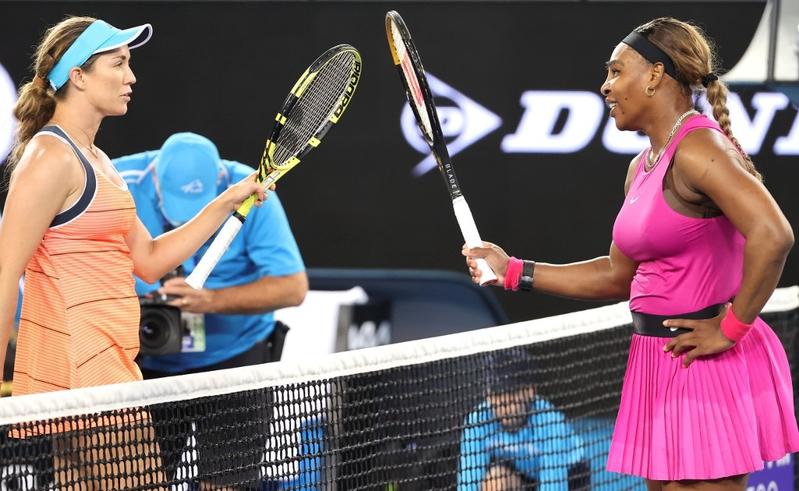 Serena Williams, right, of the US and Danielle Collins of the US touch the rackets after their Yara Valley Classic Women's singles tennis match in Melbourne on Feb 5, 2021. (PHOTO / AFP)
Serena Williams, right, of the US and Danielle Collins of the US touch the rackets after their Yara Valley Classic Women's singles tennis match in Melbourne on Feb 5, 2021. (PHOTO / AFP)
MELBOURNE - After a three-week delay, a massive logistical mission and a handful of health scares, a very different Australian Open gets underway on Monday with pandemic protocols providing a backdrop of caution to the action on court.
Serena Williams begins her latest campaign to win a record-equalling 24th Grand Slam title on Day One while Novak Djokovic is also in action, the Serb seeking a record-extending ninth Australian Open crown.
Once dubbed the ‘Happy Slam’ by Roger Federer, this year’s edition might be remembered as the ‘Nervous Slam’ after struggling to build enthusiasm in a wary host nation, but organisers hope the anxious buildup will be forgotten when the action begins.
Tennis Australia (TA) have made a Herculean effort to try to stage it safely and spent a fortune on biosecurity measures in a country where community transmission of the novel coronavirus has become rare.
It will be the third Grand Slam of the pandemic, with the US and French Opens passing safely enough.
Yet many in Melbourne regard it a pointless risk to the freedoms they earned after spending nearly four months in a brutal lockdown to crush an outbreak last year.
Warmup tournaments that packed out stadiums across the country a year ago have drawn tiny crowds to Melbourne Park over the past week, even with the game’s biggest stars in action.
A smattering of COVID-19 cases among the 1,200 Australian Open players, coaches and other personnel that landed in the country last month did little to build momentum.
Serena Williams begins her latest campaign to win a record-equalling 24th Grand Slam title on Day One while Novak Djokovic is also in action, the Serb seeking a record-extending ninth Australian Open crown
ALSO READ: Djokovic faces Chardy, Kenin meets Inglis at Australian Open
News that a worker at one of the tournament’s quarantine hotels caught the virus triggered tighter social restrictions in Melbourne last week and saw 160 players isolate until cleared of infection.
Protecting our fans
Tournament director Craig Tiley asked media to boost the tuneup events but the modest crowds that turned up on Saturday were denied the chance to watch Williams and other former champions after they pulled out of their matches rather than risk injury ahead of the main event.
Melbourne Park is usually heaving with fans but crowds will be capped at 30,000 per day during the Grand Slam, about half normal capacity.
They will have to wear masks in the showcourts if the roofs are closed. Digital tickets and the division of fans into three zones will make contact tracing easier if required.
“In our case, we have no (COVID-19) cases in the community so it’s all about protecting our fans, while in other events around the world where they have cases, it’s about protecting the athletes or acts,” TA Chief Operating Officer Tom Larner said on Sunday.
READ MORE: Australian Open concerns ease as Victoria records no new cases
The biosecurity bill may top A$40 million (US$31 million) and TA are resigned to losing a big chunk of their A$80 million in reserves to pay for it.
With Australia’s international border closed, TA will hope home fans turn up to claw back some of that outlay, and for the drama to be confined to the courts.
The onus now shifts to the players to put on a good show, and most sound thrilled about competing in a country where the virus is effectively at bay.
“We are also entertainers. We like to exchange that vibe and energy with the crowd,” said defending champion Djokovic, who plays Jeremy Chardy on Monday.
Former champion Naomi Osaka also takes the court for a tough clash against Anastasia Pavlyuchenkova, first up at Rod Laver Arena.
With luck, the two weeks will pass smoothly and trophies will be hoisted by beaming champions on centre court.
Organizers may yet triumph in staging a ‘Safe Slam’, if not the ‘Happy Slam’ of the pre-pandemic era.


